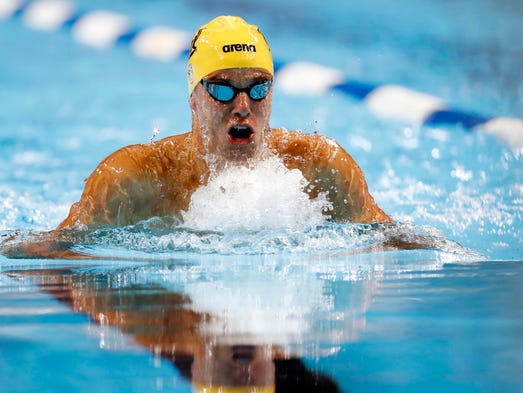Brennan: Olympic swimming trials bring heartbreak, intensity – USA TODAY
OMAHA — It is one of the most agonizing rituals not just in the Olympic world, but in all of sports. Time and again this week at the U.S. Olympic swimming trials, in race after race, someone will touch the wall first, securing a spot in Rio.
Someone else will finish second, also ensuring a berth at this August’s Summer Olympic Games.
And some poor soul will finish third and go home.
Sometimes the difference between second and third is a fraction of a second, the length of a fingernail. But, in reality, the gap might as well be as wide as the Gulf of Mexico, especially for those star-crossed swimmers who, because they missed second place by a centimeter or two, never, ever made it to the Olympics.
Today, Michelle Griglione is a 47-year-old former rocket scientist living with her husband and daughter in Orlando. Craig Beardsley is a 55-year-old former Wall Street trader and father of two living in New York City. By every measure imaginable, they are successful people, leading full and happy lives.
They both also were extraordinary swimmers. Griglione, who grew up in Alexandria, Va., won a silver medal in the 400-meter individual medley at the 1986 world championships as well as individual and team NCAA titles while at Stanford.
Beardsley, who grew up in the New York City area, qualified first in his specialty, the 200 butterfly, at the 1980 U.S. Olympic trials, but never made it to the Moscow Games because of the U.S.-led boycott. That summer, he set the world record in the 200 fly, swimming a second and a half faster than the Soviet swimmer who won the Olympic gold medal 10 days earlier.
You know where this is heading, right? They’re both members of U.S. swimming’s heartbreaking third-place club.
While Beardsley qualified for an Olympic Games but wasn’t allowed to go, Griglione just might be the best U.S. swimmer to never qualify for an Olympics. She competed at four consecutive Olympic swimming trials, from 1984 to 1996. She finished third three times, fourth four times and fifth twice.
At least once in each of those four trials, Griglione finished less than a second out of second place. In 1984, it was 0.90 of a second. In 1988, 0.25. In 1992, 0.44. And in 1996, at the age of 26, trying one last time, she finished fifth in the 200 butterfly, but just 0.75 of a second out of second place.
“It’s seared in my brain, of course,” she said over the phone Saturday. “It will always be something that stays with me. It was extremely disappointing and I could probably even describe it at the time as devastating, which is a little bit dramatic, considering we’re talking about sports.”
Griglione arrived at the 1984 trials as a 15-year-old with little to lose, but realized in the years that followed that there is nothing quite like the pressure at the U.S. swimming trials, the deepest, strongest swim meet in the world, including the Olympics.
“Maybe that was a shortcoming of mine, instead of viewing that intensity as being fun and exciting, I just viewed it as intensity,” she said.
Beardsley had a choice to make after the 1980 boycott. He could retire, or he could swim another four years for one more chance at the Olympic Games. He kept swimming.
At the same trials in which Griglione debuted with third- and four-place finishes, Beardsley fought his heart out in the 200 butterfly, only to finish third, 0.36 of a second out of an Olympic berth.
“I looked at the scoreboard and I was kind of stunned,” he said in a phone interview Sunday. “I felt deflated. I was emotionless. At that point, I was done.”
That race was 32 years ago this week. “I’ve never wanted anyone to feel sorry for me,” Beardsley said. “I hate that. What happened led to many things, including the role I still have today, which is trying to be a voice against ever having another Olympic boycott, so something really good has come from it.”
For Griglione, it has already been 20 years since her final U.S. trials disappointment.
“At this stage of my life,” she said, “when people find out that I was an alternate to the Olympic team, which is kind of how it’s described if you finish third or fourth, most people are like, ‘Oh my gosh, that is so amazing, that must have been so exciting.’
“That’s pretty funny, isn’t it?”
PHOTOS: OLYMPIC TRIALS






















